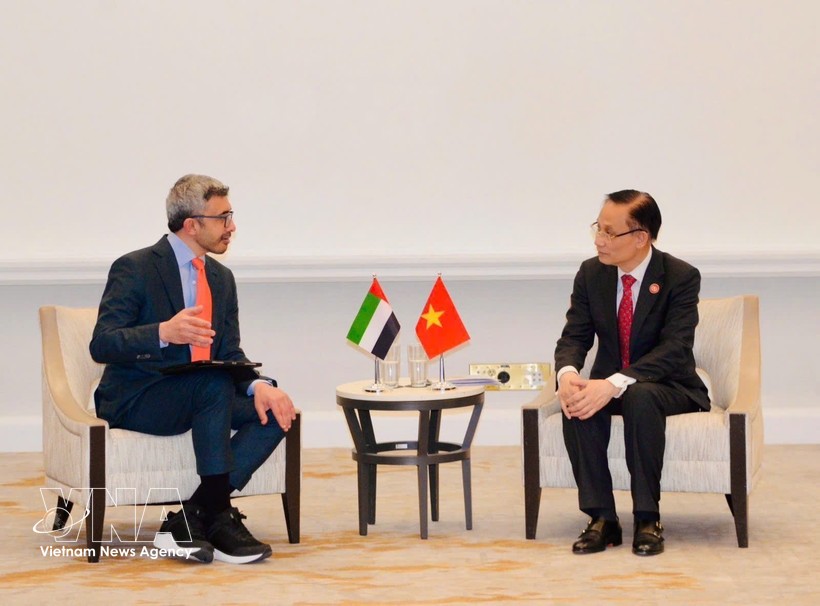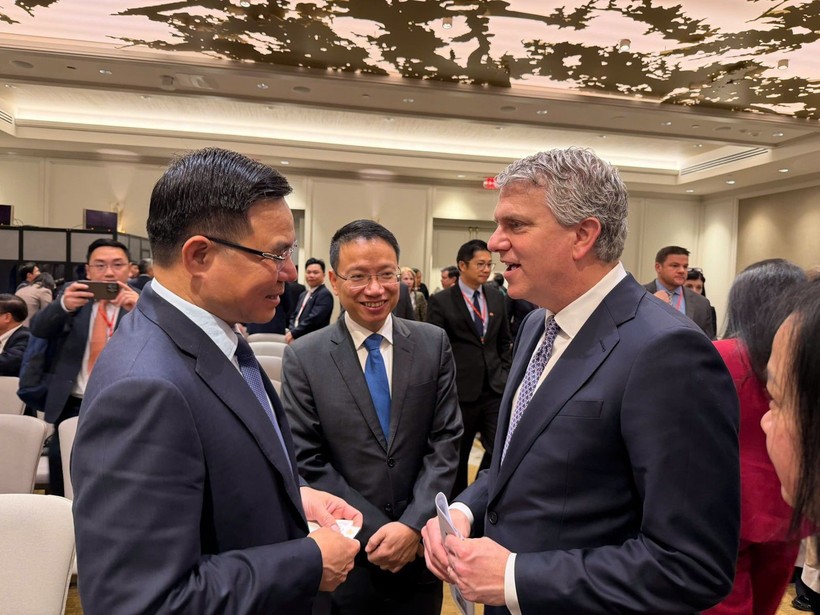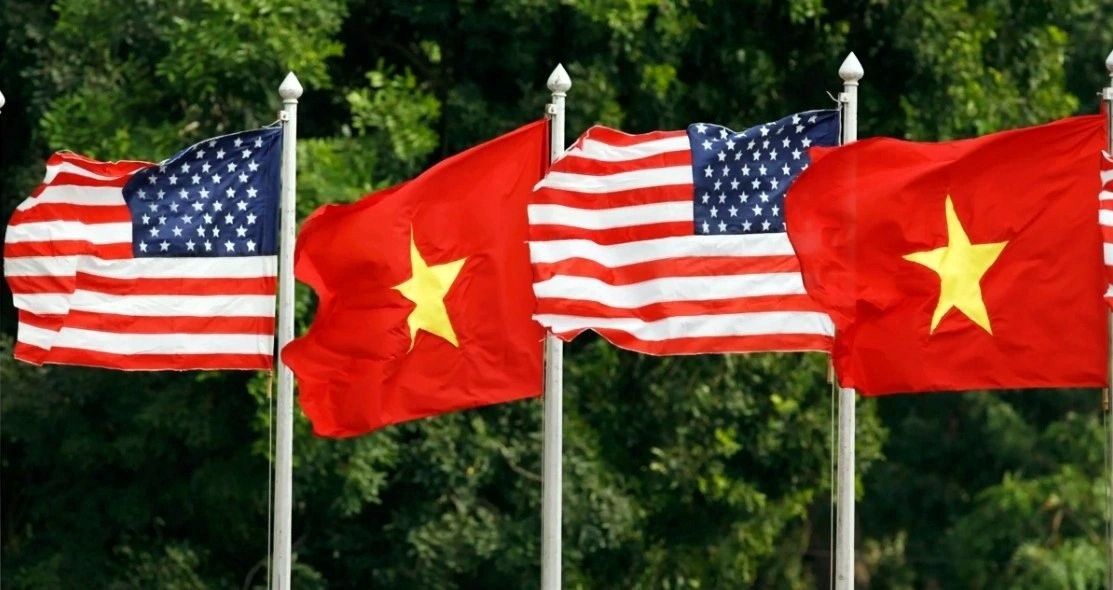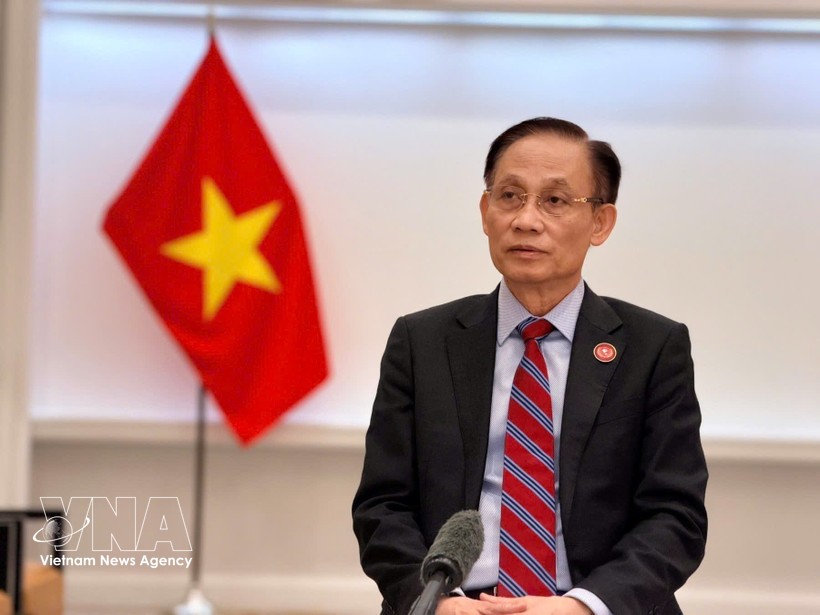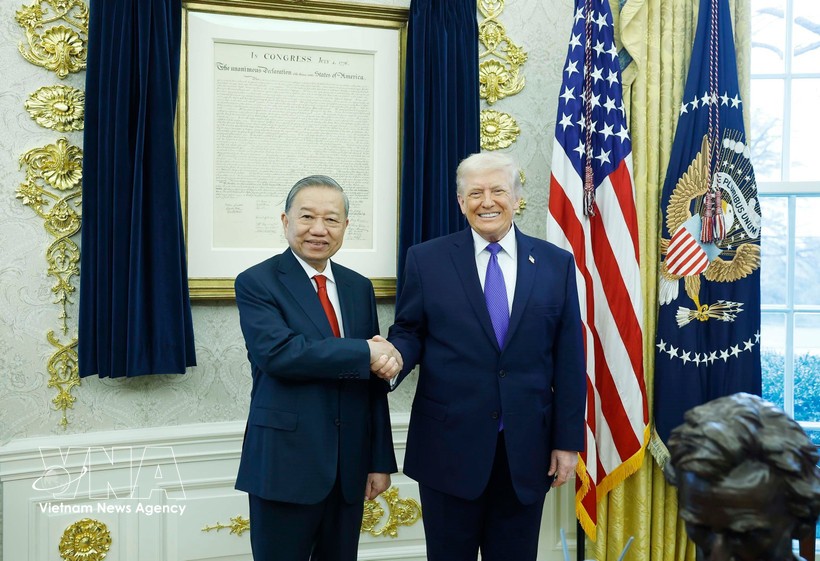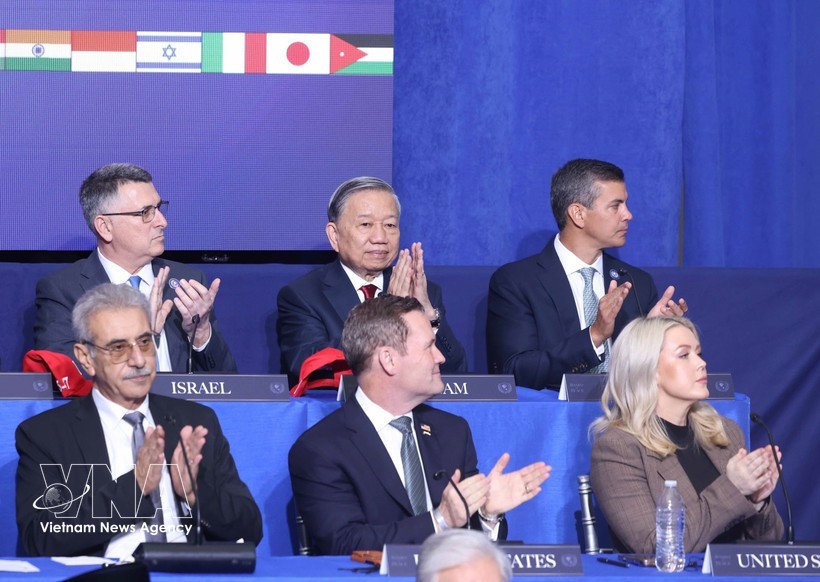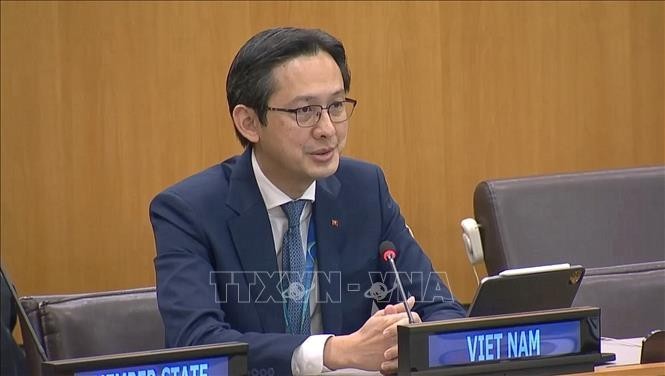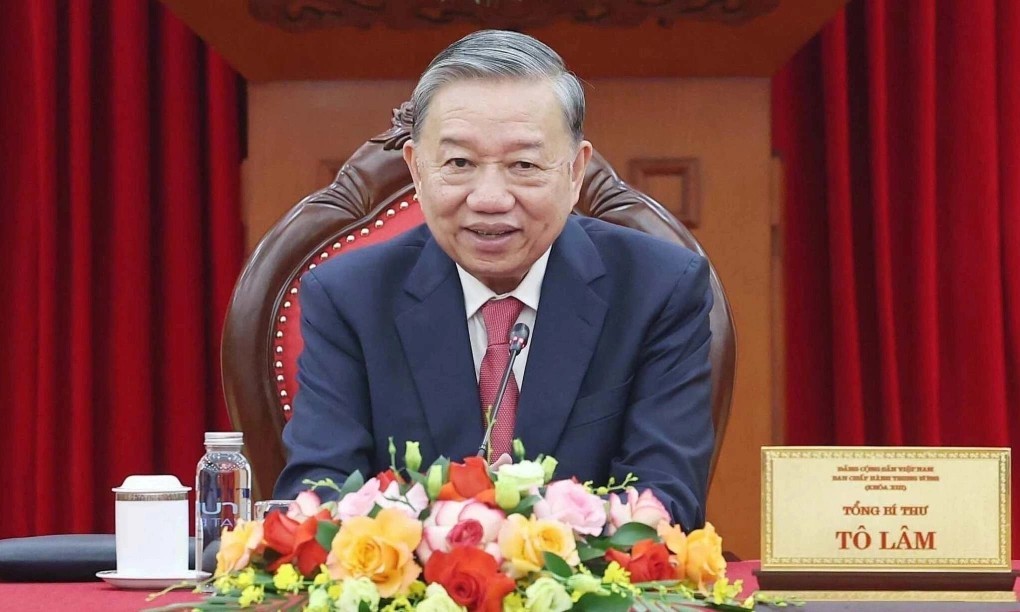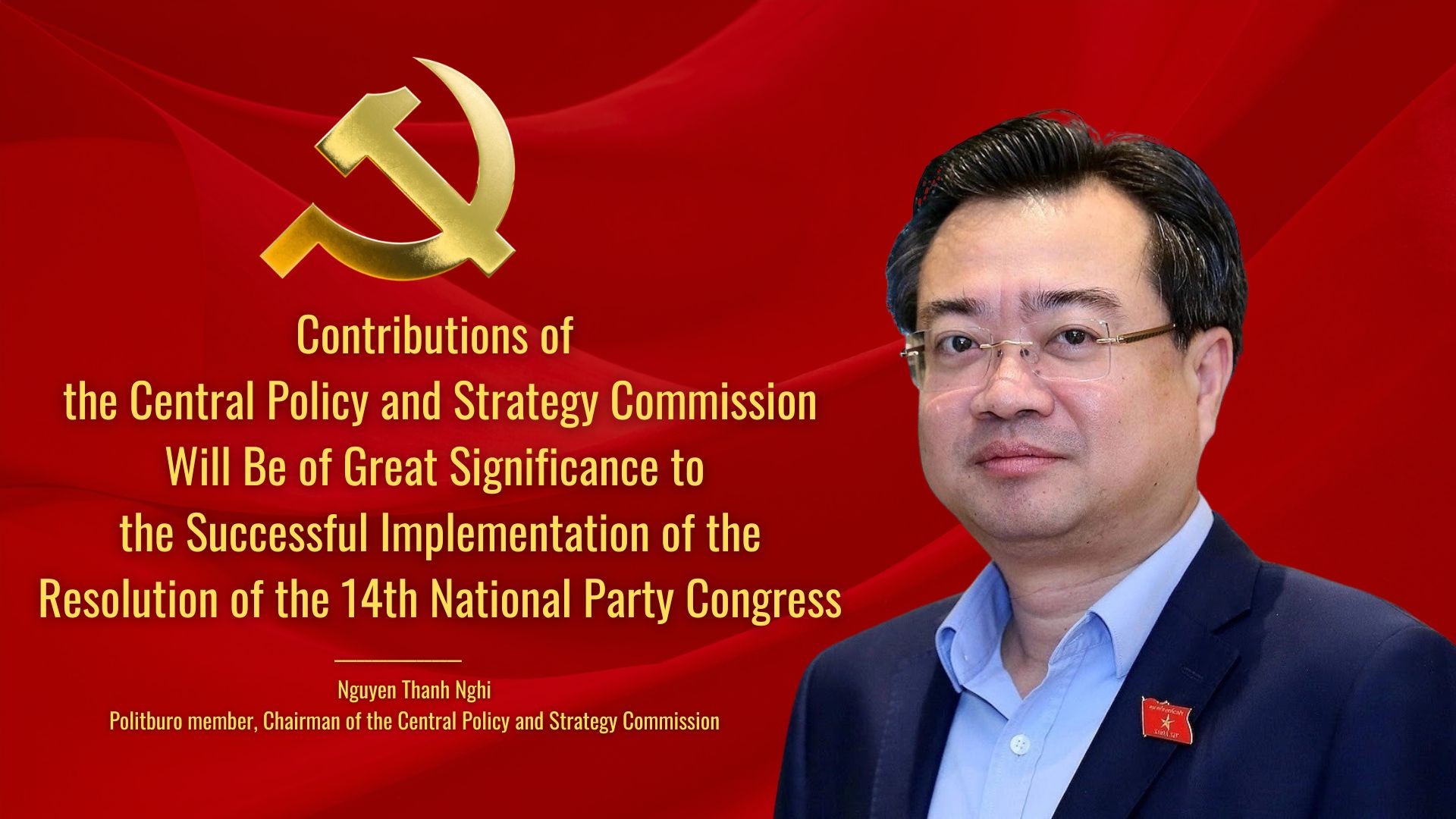| Vietnam News Today (Jul. 26) notable headlines Vietnam and Morocco pledge to boost free and sustainable trade ties Vietnam, Cuba commit to stronger ties during eighth political consultation 30 years on, Vietnam emerges as a major actor in ASEAN’s future Vietnam’s trade surge defies global headwinds Vietnam welcomes more than 10 million foreign visitors in first half of 2025 Quang Ninh tourism industry pledges safety for visitors Vietnam advises citizens to exercise caution amidst Thailand – Cambodia border issue |
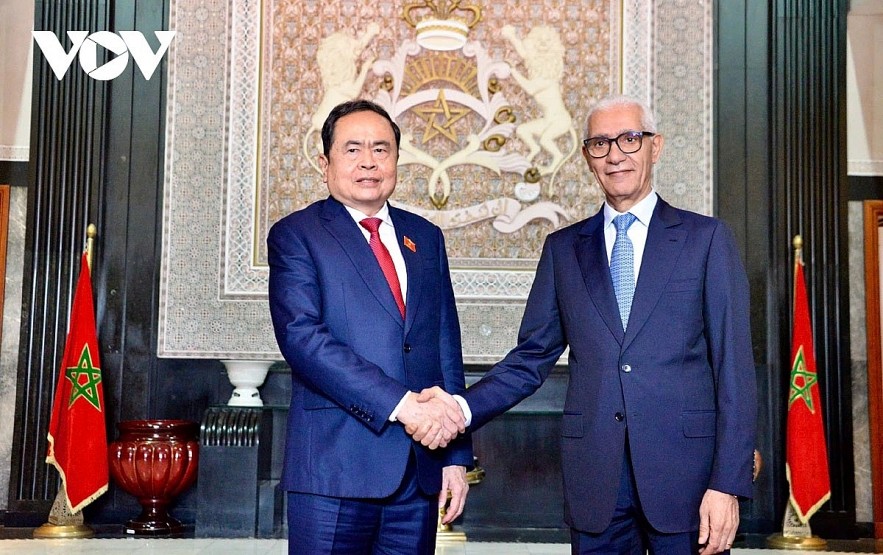 |
| Rachid Talbi Alami (R), Speaker of the House of Representatives of Morocco, and Tran Thanh Man, Chairman of the National Assembly of Vietnam, shaking hands ahead of their talks in capital Rabat on July 25. |
Vietnam and Morocco pledge to boost free and sustainable trade ties
Vietnam and Morocco have reaffirmed their commitment to enhancing bilateral ties, with a strong focus on promoting free and sustainable trade initiatives within multilateral frameworks.
The agreement was reached during talks in Morocco’s capital Rabat on July 25 between Rachid Talbi Alami, Speaker of the House of Representatives of Morocco and Tran Thanh Man, Chairman of the National Assembly of Vietnam who was on an official visit to the African nation.
National Assembly Chairman Man acknowledged the positive momentum in Vietnam-Morocco trade relations, with two-way trade exceeding US$320 million in the first five months of 2025, surpassing the total for 2024.
However, he said, this figure remains modest compared to the two countries’ potential, and suggested that both sides enhance information sharing, promote free and sustainable trade initiatives multilaterally, and explore joint production and third-market exports.
He proposed negotiating a new trade agreement suited to current global dynamics and ramping up cooperation in strategic sectors such as agricultural processing, fertiliser production, and renewable energy, cited VOV.
Speaker Alami, for his part, welcomed discussions on negotiating a new trade agreement, upgrading cooperation frameworks, and enhancing mechanisms like the Vietnam – Morocco Intergovernmental Committee and possibly forming a joint body with participation from the parliaments, ministries, and businesses of both nations.
He proposed that both countries build mutually beneficial partnerships and serve as gateways for each other into their respective regions.
The Moroccan legislator praised Vietnam’s impressive socio-economic achievements and affirmed its growing importance in Morocco’s foreign policy. He expressed his belief that Chairman Man’s visit would open a new phase in parliamentary cooperation and contribute to expanding bilateral ties in key areas such as agriculture, renewable energy, climate change, phosphate, electric vehicles, textiles, electronics, and tourism.
Chairman Man, in turn, expressed admiration for Morocco's rich history, culture, and strategic position in North Africa. He recalled the historic Vietnam-Morocco friendship, forged during Vietnam’s struggle for national independence in the 20th century, notably marked by the solidarity of Moroccan soldiers with the Viet Minh (Vietnamese soldiers). He cited symbolic monuments like the Morocco Gate in Ba Vi and the Vietnam Gate in Morocco as enduring symbols of this friendship.
The Vietnamese leader noted the solid achievements in parliamentary relations since the 2017 cooperation agreement, including regular exchanges, seminars, and effective collaboration through friendship groups and multilateral forums. He called for continued efforts to deepen mutual understanding and enhance collaboration for the benefit and prosperity of both peoples.
He recalled the historic Vietnam-Morocco friendship, forged during Vietnam’s struggle for independence, notably marked by the solidarity of Moroccan soldiers with the Viet Minh. He highlighted symbolic structures like the Morocco Gate in Ba Vi (Vietnam) and the Vietnam Gate in Morocco as testaments to this bond.
The two leaders agreed to deepen political trust through increased exchanges at all levels and sectors, including direct contact between ministries and businesses, while reinforcing multilateral cooperation, particularly within the United Nations and inter-regional platforms.
Discussing regional and global issues of mutual concern, the two sides pledged to resolve disputes peacefully, refrain from the use or threat of force, and uphold international law and the UN Charter.
On this occasion, Chairman Tran Thanh Man invited Speaker Rachid Talbi Alami to visit Vietnam, and the Moroccan parliamentary leader accepted the invitation with pleasure.
Vietnam, Cuba commit to stronger ties during eighth political consultation
Vietnam and Cuba reaffirmed the commitment to deepening their historic partnership during the eighth political consultation in Hanoi on July 24, co-chaired by Vietnam’s Standing Deputy Minister of Foreign Affairs Nguyen Minh Vu and Cuba’s First Deputy Minister of Foreign Affairs Gerardo Peñalver Portal during the latter’s official visit to Vietnam from July 22-25.
Vu briefed his Cuban guest on Vietnam’s recent socio-economic progress and outlined plans, affirming that the Vietnamese Party, State, and people always attach great importance to the traditional solidarity, special friendship, and comprehensive cooperation with Cuba.
He expressed optimism about Cuba’s ability to navigate its current challenges, successfully advance its socio-economic model update ahead of the ninth Congress of the Communist Party of Cuba in April 2026.
Portal, in response, asserted Cuba’s consistent commitment to further deepening its special relationship with Vietnam, a bond founded by President Ho Chi Minh and leader Fidel Castro. He expressed heartfelt gratitude for the solidarity and sincere support that the Vietnamese Party, State, and people have extended to Cuba over the past years. He also updated the Vietnamese side on Cuba’s internal situation and ongoing efforts to update its socio-economic model amid difficulties.
Both sides reviewed the state of cooperation between their respective ministries, with a consensus on measures to further strengthen the special friendship and comprehensive partnership between the two countries. This includes close coordination to realize the outcomes of the state visit to Cuba by Party General Secretary and State President To Lam in September 2024, particularly in key sectors such as food production, energy, and biotechnology. These aim to make trade and investment cooperation match their fine political ties, according to VNA.
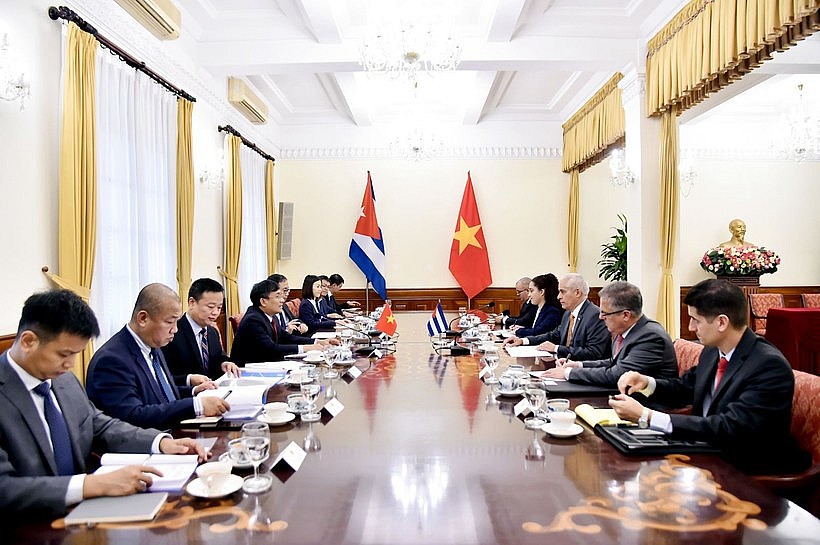 |
| At the political consultation (Photo: VNA) |
They agreed to facilitate high-level visits and exchanges, and make full use of existing cooperation mechanisms, including the theoretical workshops between the two Parties, the Inter-Governmental Committee on Economic and Scientific-Technical Cooperation, and the political consultations between the foreign ministries. They committed to fostering greater exchanges among ministries, agencies, localities, and business communities, and jointly holding a series of events marking the 65th anniversary of diplomatic ties in 2025, designated as the Vietnam-Cuba Friendship Year.
On global and regional issues of shared concern, they promised to maintain close consultation and support each other at multilateral forums of which both countries are members.
The consultation concluded with the signing of a 2026–2028 political consultation plan.
Earlier on July 23, Portal paid a courtesy call to Vietnamese Deputy Prime Minister and Minister of Foreign Affairs Bui Thanh Son, met with Vice Chairman of the National Assembly’s Committee on National Defense, Security and External Relations Nguyen Manh Tien, and Deputy Minister of Construction Nguyen Xuan Sang.
He also visited the Ho Chi Minh Mausoleum, laid a wreath at a memorial dedicated to Cuban national hero José Martí, and toured several economic establishments and cultural-historical sites in Hanoi.
30 years on, Vietnam emerges as a major actor in ASEAN’s future
Thirty years after joining the Association of Southeast Asian Nations (ASEAN), Vietnam has progressed from a learning participant to a major actor, helping to shape the bloc’s development path, according to Ambassador Ton Thi Ngoc Huong, Head of the Permanent Mission of Vietnam to ASEAN.
Ambassador Huong, in a recent interview granted to Vietnam News Agency, emphasised that accession to ASEAN on July 28, 1995 marked a turning point in the country’s regional and global integration. Over the past three decades, Vietnam has progressed from a newcomer to an active contributor and architect of ASEAN’s cohesion, resilience, and strategic adaptability.
The country has played a pivotal role in strengthening ASEAN unity, bridging internal differences, and fostering stronger external partnerships, helping to maintain the grouping’s centrality in the regional architecture. Its proactive efforts contributed significantly to the realisation of the ASEAN-10, bringing all Southeast Asian nations under one roof by 1999.
Highlighting Vietnam’s major contributions to ASEAN, the diplomat recalled that just three years after joining the bloc, Vietnam hosted the sixth ASEAN Summit in 1998, steering ASEAN through the 1997 Asian financial crisis with the adoption of the Hanoi Action Plan. As Chair of the ASEAN Standing Committee in 2000–2001, the country advanced the Initiative for ASEAN Integration (IAI) to narrow the development gap.
As ASEAN Chair again in 2010, the country helped expand regional structures with the East Asia Summit (EAS) and the ASEAN Defense Ministers’ Meeting Plus (ADMM+). During its 2020 ASEAN Chairmanship, amid the global COVID-19 pandemic, Vietnam led a coordinated response through initiatives such as the ASEAN COVID-19 Response Fund, a regional medical stockpile, and the Comprehensive Recovery Framework.
Vietnam has also played an instrumental role in fostering ASEAN’s relations with external partners. It has served as country coordinator for ties with China, the European Union, India, Japan, the Republic of Korea, New Zealand, and the UK. Currently, it is coordinating two partnerships, namely ASEAN–UK and ASEAN–New Zealand for 2024–2027, reported VOV.
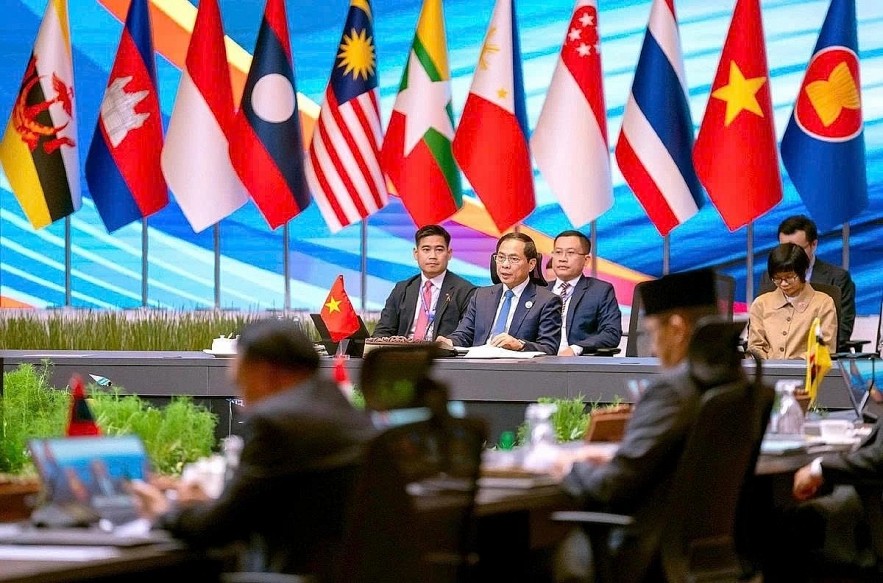 |
| Vietnamese Deputy Prime Minister and Minister of Foreign Affairs Bui Thanh Son co-chairs the ASEAN - UK Ministerial Meeting in Kuala Lumpur, Malaysia, on July 11, 2025. (Photo: MOFA) |
By working together to shape ASEAN's development path, the diplomat said, Vietnam has made significant contributions to defining goals and forming major policy decisions of ASEAN, including key documents such as the ASEAN Vision 2020, the ASEAN Charter, the ASEAN Community Vision 2025 and 2045, as well as blueprints on connectivity and narrowing the development gap within ASEAN.
According to her, the ASEAN membership has created vast opportunities for Vietnam’s economic growth. Two-way trade between Vietnam and ASEAN reached US$83.6 billion in 2024, nearly 25 times higher than in 1995. ASEAN is Vietnam’s fourth largest export and third largest import market. Participation in regional free trade agreements (FTAs), including the Regional Comprehensive Economic Partnership (RCEP), has enhanced Vietnam’s global market access and investment inflows.
Vietnamese citizens have benefitted directly from ASEAN cooperation in areas such as education, health care, entrepreneurship, green and digital transformation, sustainable agriculture, climate action, and disaster risk reduction.
Looking toward 2045 when Vietnam marks its 100th founding anniversary, the country reaffirms its commitment to an active, responsible, and forward-looking ASEAN membership, harmonising national interests with the broader regional agenda.
Vietnam will continue to harness global megatrends such as digital transformation, innovation, green growth, and sustainable infrastructure, while reinforcing its position in resilient regional supply chains and contributing to ASEAN’s dynamic and inclusive growth.
As ASEAN is projected to become the world’s 4th largest economy by 2030, Vietnam is determined to play a leading role in shaping this shared future.
ASEAN has also provided a dynamic multilateral environment for Vietnam to enhance its international integration capacity, develop diplomatic expertise, and broaden global partnerships with major powers and key regional actors.
As ASEAN transitions into a new development phase of implementing the ASEAN Community Vision 2045, the ambassador said, Vietnam is taking on key leadership roles. The country is leading efforts to build the IAI Work Plan V (2026–2030), aligning it with ASEAN Vision 2045 goals to promote inclusive, sustainable development and reduce regional disparities.
As country coordinator for ASEAN-New Zealand Relations for 2024-2027, it is preparing for the 50th anniversary of ASEAN–New Zealand relations in 2025, aiming to elevate the partnership to a Comprehensive Strategic Partnership and adopt a new Action Plan for 2026–2030.
As country coordinator for ASEAN–UK Relations for 2026–2030, it is stepping up the implementation of the 2022-2026 Action Plan, now at a 95% implementation rate, while preparing for the 5th anniversary of the ASEAN–UK Dialogue Partnership in 2026 and formulating the next Action Plan for 2027–2031.
Fulfilling these tasks amid numerous challenges to multilateral cooperation will be a practical and meaningful contribution by Vietnam to ASEAN at a crucial turning point thereby helping to promote regional integration, uphold ASEAN’s centrality, and enhance its image and position, said the ambassador.
Vietnam’s trade surge defies global headwinds
Vietnam’s export-import sector maintained its vigorous pace into the first half of July, emerging as a standout driver of economic growth despite global uncertainties thanks to strong demand for electronics, apparel, and machinery.
Export-import nears 500 billion USD mark
Vietnam’s trade turnover hit 38.17 billion USD in the first half of July, with exports reaching 19 billion USD and imports at 19.17 billion USD, according to the Ministry of Finance’s Department of Customs. From January 1 to July 15, total trade volume reached 470.65 billion USD, comprising 239.2 billion USD in exports and 231.45 billion USD in imports, racking up a 7.75 billion USD trade surplus.
June posted a trade value of 75.59 billion USD, while May set a record at 78.64 billion USD, the highest monthly figure this year. At this pace, total trade is on track to surpass the 500 billion USD mark by the end of this month.
Top currency earners kept the cash flowing in early July. Computers, electronics, and components raked in 3.88 billion USD, followed by phones and components 2.52 billion USD. Machinery, equipment, and spare parts hauled 2.3 billion USD, apparel scored 1.82 billion USD, and footwear crossed the 1 billion USD mark.
Other sectors, including aquatic products, fruits and vegetables, wood and wooden furniture, transport vehicles, toys, and sports equipment, added hundreds of millions of USD to the export tally.
On the import side, computers, electronics, and components led the pack at 6.55 billion USD. The next was machinery, equipment, and spare parts 2.7 billion USD.
The import surge signals Vietnamese factories are in overdrive, scrambling to meet massive export orders. It is a clear sign the manufacturing sector is thriving, riding a wave of global demand, cited VNA.
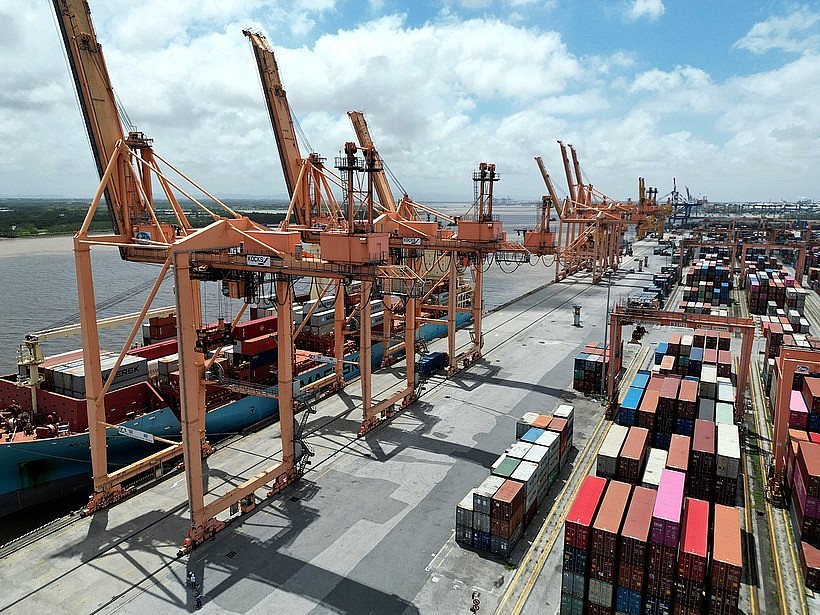 |
| Goods at Hai Phong Port in northern port city of Hai Phong. (Photo: VNA) |
The Ministry of Industry and Trade (MoIT) attributed the robust trade rebound to proactive policies that bolster domestic production, promote trade, and expand export markets.
Sprinting to crush year-end goals
As the second half of 2025 kicked off, exporters are in a dash to hit their targets. Yet, trouble is brewing: global growth is slowing, geopolitical tensions are spiking, and climate chaos are persistent, all stirring up uncertainty into global trade.
Le Phung Hao, Chairman of Global AAA Consulting, called for swift adaptation to the volatile global market. “The pressure is immense, requiring companies to restructure operations, go digital, embrace technology, enhance productivity, and sharpen their competitive edge,” Hao said, stressing the need to diversify export markets, leverage existing free trade agreements (FTAs) to avoid leaning too hard on any buyer.
Commenting on the Vietnam – US trade relations, Prof. Tran Ngọc Anh from the US’s Indiana University hailed the US as a vital export market despite shifting trade policies.
“Even with tariffs in place, there are still opportunities”, he said. “As supply chains adjust, Vietnam should seize the chance to increase imports from the US, invest in supporting industries, and level up technology and management capabilities to climb up in the value chain”.
Headwinds will linger in late 2025 and into 2026, but it is hoped that tariff talks could give Vietnam an edge over its rivals, keeping its appeal to foreign investors intact.
The MoIT pledged to pursue fair and reciprocal trade agreements with the US, beef up early risk warning systems, back trade defense cases, and help exporters overcome new global technical barriers.
Vietnam welcomes more than 10 million foreign visitors in first half of 2025
The total number of international tourist arrivals to Vietnam in the first six months of 2025 is estimated at 10,664,608, an increase of 20.7% compared to the same period in 2024. Domestic tourism is estimated at 77.5 million arrivals. Total revenue from tourism is estimated at 518 trillion VND.
The figures were released on July 24, during the second quarterly press conference held by the Ministry of Culture, Sports and Tourism.
According to the ministry, in the first half of the year, it had developed and implemented the 2025 Tourism Stimulus Program; participated in international tourism fairs; coordinated activities within the framework of the 2025 Hue National Tourism Year; organised promotional events for Vietnamese tourism in European countries (Italy, Switzerland, France, Poland, the Czech Republic, and Germany); promoted Vietnamese tourism through cinema at the Cannes Film Festival and side events; and conducted tourism promotion activities at the 4th Partnership for Green Growth and the Global Goals 2030 (P4G) Summit.
Additionally, the ministry coordinated with relevant departments from the Ministry of Foreign Affairs and the Ministry of Public Security to propose visa policies (expanding the list of short-term visa exemptions, suggesting lists of priority groups, and preferential visa policies in specific management sectors, etc.).
Commenting on the number of tourists in the first half of the year, Nguyen Huu Ngoc, Deputy Chief of the Ministry’s Office, affirmed that with 10,664,608 international arrivals in the first six months of 2025, up 20.7% year on year, the figures indicate positive signals and reaffirm that tourism continues to be a bright spot in the country's overall development landscape.
In parallel, domestic tourism also reached an impressive figure of 77.5 million arrivals. Total tourism revenue was estimated at 518 trillion VND, reflecting a strong recovery and making a positive contribution to the national economy.
The 20.7% year-on-year increase in international arrivals to Vietnam in the first half of 2025 represents a highly encouraging sign for the country's tourism sector, NDO reported.
 |
| Co Island Ecotourism Site, Hai Phong. |
To achieve the targets of 22–23 million international tourist arrivals and over 120–130 million domestic tourist arrivals, thereby contributing to the national goal of over 8% GDP growth in 2025 and sustaining double-digit growth in the coming period, the entire tourism sector will focus on implementing key tasks and solutions in the remaining months of the year.
Particular emphasis will be placed on effectively executing the 2025 Tourism Stimulus Program. Enterprises, organisations, and individuals involved in travel services, tourism areas and attractions, accommodation facilities, and other tourism service providers are encouraged to cooperate and offer attractive incentives, including pricing, new service types, and innovative products to enhance tourist experiences.
Tourism markets will also be restructured to better align with Vietnam’s strengths and potential, while adapting to global trends and responding flexibly to fluctuations in the international tourism landscape.
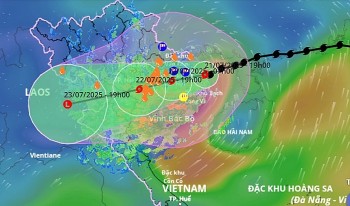 | Vietnam News Today (Jul. 22): Northern Localities Put On Alert as Wipha Set to Make Landfall on July 22 Vietnam News Today (Jul. 22): Vietnamese, Singaporean Party officials hold talks; Northern localities put on alert as Wipha set to make landfall on July 22; ... |
 | Vietnam News Today (Jul. 23): Vietnam Makes Remarkable Stride on Global AI Index Vietnam News Today (Jul. 23): Vietnam, Singapore forge Party ties and wide-ranging cooperation; Regional cooperation spurs green tourism for net zero future; Vietnam makes remarkable ... |











